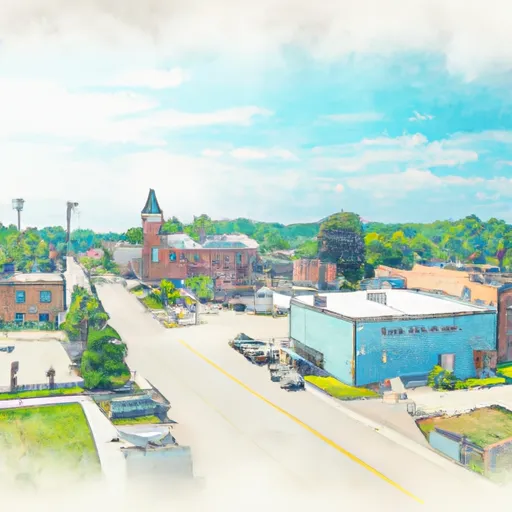-
 Snoflo Premium
Snoflo Premium
Get unlimited access to all our content
With no Ad interruptions! - Start Your Free Trial Login with existing account
Skanee
Eden Index
Climate
6.3
•
Recreation
0.6
•
Community
1.4
•
Safeguard
3.1/10

Skanee is a small unincorporated community located in Baraga County, Michigan. It is situated in the Upper Peninsula, surrounded by beautiful natural landscapes. Skanee experiences a typical continental climate, with cold winters and mild summers. Average temperatures range from the low 20s (-6°C) in winter to the high 70s (25°C) in summer.
The region's hydrology constituents are primarily composed of numerous lakes and rivers. Skanee is surrounded by several pristine lakes, including Huron Bay, Lake Superior, and several smaller inland lakes. These water bodies offer excellent opportunities for fishing, boating, and swimming.
Outdoor recreation enthusiasts will find plenty to do in Skanee. The area is known for its exceptional hiking and biking trails, offering breathtaking views of the surrounding forests and lakes. The nearby Huron Mountains provide opportunities for hiking, mountain biking, and wildlife viewing. In winter, Skanee transforms into a winter wonderland, with ample opportunities for snowmobiling, cross-country skiing, and ice fishing.
Overall, Skanee, Michigan, offers a picturesque setting with a diverse range of activities for nature lovers and outdoor enthusiasts.
What is the Eden Index?
The Snoflo Eden Index serves as a comprehensive rating system for regions, evaluating their desirability through a holistic assessment of climate health, outdoor recreation opportunities, and natural disaster risk, acknowledging the profound impact of these factors on livability and well-being.
Climate Health Indicator (CHI): 6.3
Skanee receives approximately
779mm of rain per year,
with humidity levels near 84%
and air temperatures averaging around
7°C.
Skanee has a plant hardyness factor of
5, meaning
plants and agriculture in this region thrive during a short period during spring and early summer. Most
plants will die off during the colder winter months.
By considering the ideal temperature range, reliable water supplies, clean air, and stable seasonal rain or snowpacks, the Climate Health Indicator (CHI) underscores the significance of a healthy climate as the foundation for quality living.
A healthy climate is paramount for ensuring a high quality of life and livability in a region, fostering both physical well-being and environmental harmony. This can be characterized by ideal temperatures, reliable access to water supplies, clean air, and consistent seasonal rain or snowpacks.
Weather Forecast
Streamflow Conditions
Southcentral Lake Superior
Area Rivers
Southcentral Lake Superior
Snowpack Depths
Southcentral Lake Superior
Reservoir Storage Capacity
Southcentral Lake Superior
Groundwater Levels
Recreational Opportunity Index (ROI): 0.6
The Recreational Opportunity Index (ROI) recognizes the value of outdoor recreational options, such as parks, hiking trails, camping sites, and fishing spots, while acknowledging that climate plays a pivotal role in ensuring the comfort and consistency of these experiences.
Access to outdoor recreational opportunities, encompassing activities such as parks, hiking, camping, and fishing, is crucial for overall well-being, and the climate plays a pivotal role in enabling and enhancing these experiences, ensuring that individuals can engage in nature-based activities comfortably and consistently.
Camping Areas
| Campground | Campsites | Reservations | Toilets | Showers | Elevation |
|---|---|---|---|---|---|
| Prairie Pines Campground | None | 730 ft | |||
| Desplaines Conservational Park | None | 553 ft | |||
| Goodman County Park | None | 1,235 ft | |||
| New Prospect - Kettle Moraine State Forest | None | 1,165 ft | |||
| McClintock County Park | None | 1,240 ft | |||
| Kankakee River State Park | 260 | 595 ft | |||
| Deer Lake - State Forest | 12 | 1,583 ft | |||
| South City (Gibson) Park | None | 741 ft | |||
| Des Plaines State Conservation Area | 22 | 516 ft | |||
| Twelve Foot Falls County Park | 11 | 1,109 ft |
Nearby Ski Areas
Catastrophe Safeguard Index (CSI):
The Catastrophe Safeguard Index (CSI) recognizes that natural disaster risk, encompassing floods, fires, hurricanes, and tornadoes, can drastically affect safety and the overall appeal of an area.
The level of natural disaster risk in a region significantly affects safety and the overall livability, with climate change amplifying these risks by potentially increasing the frequency and intensity of events like floods, fires, hurricanes, and tornadoes, thereby posing substantial challenges to community resilience and well-being.
Community Resilience Indicator (CRI): 1.4
The Community Resilience Indicator (CRI) recognizes that education, healthcare, and socioeconomics are crucial to the well-being of a region. The CRI acknowledges the profound impact of these elements on residents' overall quality of life. By evaluating educational resources, healthcare accessibility, and economic inclusivity, the index captures the essential aspects that contribute to a thriving community, fostering resident satisfaction, equity, and social cohesion.

